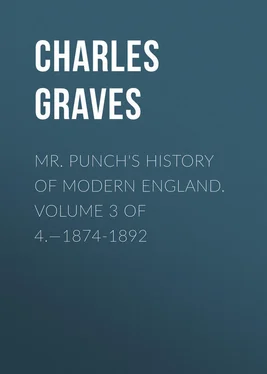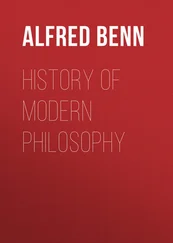Charles Graves - Mr. Punch's History of Modern England. Volume 3 of 4.—1874-1892
Здесь есть возможность читать онлайн «Charles Graves - Mr. Punch's History of Modern England. Volume 3 of 4.—1874-1892» — ознакомительный отрывок электронной книги совершенно бесплатно, а после прочтения отрывка купить полную версию. В некоторых случаях можно слушать аудио, скачать через торрент в формате fb2 и присутствует краткое содержание. ISBN: , Издательство: Иностранный паблик, Жанр: foreign_prose, foreign_humor, на английском языке. Описание произведения, (предисловие) а так же отзывы посетителей доступны на портале библиотеки ЛибКат.
- Название:Mr. Punch's History of Modern England. Volume 3 of 4.—1874-1892
- Автор:
- Издательство:Иностранный паблик
- Жанр:
- Год:неизвестен
- ISBN:http://www.gutenberg.org/ebooks/47300
- Рейтинг книги:3 / 5. Голосов: 1
-
Избранное:Добавить в избранное
- Отзывы:
-
Ваша оценка:
- 60
- 1
- 2
- 3
- 4
- 5
Mr. Punch's History of Modern England. Volume 3 of 4.—1874-1892: краткое содержание, описание и аннотация
Предлагаем к чтению аннотацию, описание, краткое содержание или предисловие (зависит от того, что написал сам автор книги «Mr. Punch's History of Modern England. Volume 3 of 4.—1874-1892»). Если вы не нашли необходимую информацию о книге — напишите в комментариях, мы постараемся отыскать её.
Mr. Punch's History of Modern England. Volume 3 of 4.—1874-1892 — читать онлайн ознакомительный отрывок
Ниже представлен текст книги, разбитый по страницам. Система сохранения места последней прочитанной страницы, позволяет с удобством читать онлайн бесплатно книгу «Mr. Punch's History of Modern England. Volume 3 of 4.—1874-1892», без необходимости каждый раз заново искать на чём Вы остановились. Поставьте закладку, и сможете в любой момент перейти на страницу, на которой закончили чтение.
Интервал:
Закладка:
The success of a Russian Loan is not dearly purchased by a little effusion, which, after all, commits Russia to nothing. French sentiment is always worth cultivating in that way, because unlike the British variety, it has a distinct influence upon investments.
The cartoon of President Carnot embracing, and being hugged by, the Bear was founded on an episode at Aix-les-Bains where he kissed a little girl in Russian dress who gave him a bouquet, saying: "J'embrasse la Russie." Punch's verses represent Carnot as fully conscious of his blague , yet with an uneasy consciousness that the Bear is going to squeeze him. Russia's religious intolerance again comes in for strong condemnation. The Tsar is shown wielding the knout on an aged Jew while the Emperor of China greets a Christian priest. This contrast was based on the issue of a decree in which the Chinese Government condemned anti-Christian excesses. In another cartoon the Tsar bids his minions remove another aged Jew on the familiar ground that Jews were always to the fore in Nihilist plots. The European Powers, it should be added, were not satisfied by China's official tolerance. The treatment of foreigners had provoked a collective protest, from which Russia abstained. So when John Bull, as a sailor, asks Russia to take a hand in controlling the Chinese Dragon, Russia replies: "Well, I don't know – you see, he's a sort of relation of mine!"
The admiration which Punch had so often if reluctantly expressed for Bismarck in office yielded to something like disgust at his undignified bitterness in retirement, above all at his use of the "reptile press" as a means of attacking the Imperial policy and Caprivi, his successor as Chancellor. This feeling animates the "Coriolanus" cartoon in February, where Bismarck is shown with the Hamburger Nachrichten in his hand. The death of Moltke a couple of months later is duly recorded in a versified tribute making all the usual points – on his taciturnity, composure, foresight and strategy. With his death Bismarck became the lonely survivor of "the Titanic three, Who led the Eagles on to Victory." Moltke died full of years and honours. It was otherwise with Parnell who at forty-five fell,
not as leaders love to fall,
In battle's forefront, loved and mourned by all;
But fiercely fighting, as for his own hand,
With the scant remnant of a broken band;
His chieftainship, well-earned in many a fray,
Rent from him – by himself!
None did betray
This sinister strong fighter to his foes;
He fell by his own action, as he rose.
He had fought all – himself he could not fight,
Nor rise to the clear air of patient right.
The Passing of Parnell
Punch notes his coldness, his impassive persistence as an agitator, but says nothing of the ill-concealed contempt he showed for his followers, and the entire lack of geniality, bonhomie , and humour, which partly explained the mercilessness with which he was pursued once his power was shaken. As he had never won or tried to win their affection, he could not expect to find magnanimity in mean souls.
The wheels of the Parliamentary chariot drove heavily over the Land Purchase Bill. Punch showed Mr. Balfour leading the poor tired little Bill through a maze of amendments. A propos of its complicated nature and endless, obscure sub-sections, which aroused much hostile criticism in The Times , Mr. Balfour is made to say: —
The Times , too, may gird, and declare 'tis absurd not to know one's own Labyrinth better;
The Times is my friend, but a trifle too fond of the goad and the scourge and the fetter.
This, of course, was in the days when The Times was ultra-Unionist. However, the Bill finally passed through its various stages, and Mr. W. H. Smith exhibits it with the fruits of the Session in June, 1891, as a gigantic strawberry. The choice of this particular fruit as a symbol was dictated by the fact that both he and Lord Salisbury had exhibited strawberries at the Horticultural Show.
The relations of Canada with England and the United States provoked much discussion in 1891. Punch expressed confidence in Canada's loyalty, and simultaneously published a burlesque "Canadian Calendar (to be hoped not prophetic)," foretelling complete absorption in the United States. It begins with Reciprocity with the U.S.A., and goes on with the dying out of trade with and emigration from the old country, the increase of improvident Irish, the request of Canada to be annexed to America, and finally her decline into a tenth-rate Yankee state. On the death of the Canadian premier, Sir John Macdonald, "old To-morrow" as he was nicknamed from his habit of procrastination, Punch overlooked the thrasonical magniloquence criticized in an earlier poem, and only dwelt on his long services to the Dominion.
Earlier in the year Punch had typified the Federation of the Australian Colonies in a boating cartoon, the British Lion from the bank applauding a racing eight, manned by cubs and coxed by a kangaroo, and bidding them swing together.
On the death of the old Duke of Devonshire at the close of 1891, and the accession of Lord Hartington to the title, Mr. Chamberlain became leader of the Liberal-Unionists in the Commons. Mr. Chamberlain, in spite of the rapprochement already noted, was still looked upon in some quarters as a somewhat dangerous Radical, and in January, 1892, Punch represented the clock-faced Times lecturing him on his responsibilities. Mr. Balfour succeeded Mr. W. H. Smith on the death of that unselfish, honest and capable statesman, as Leader of the House of Commons. The shades of Dizzy and Pam are friendly in the cartoon which records the promotion; slightly anxious on the score of Mr. Balfour's youth – he was then forty-four – but on the whole inclined to think that he will do. Parliament was dissolved in June, the Liberals were returned at the Elections, and the new House met on the now ominous date of August 4.
"Scuttle" and "Grab"
In the 'seventies Punch , as we have seen, was decidedly non-interventionist. By the middle 'eighties he found it harder to preserve a middle course between the extremes of Jingoism and Pacificism, though he bestows impartial ridicule on both "Scuttle and Grab" in his burlesque forecast of the alternate foreign policies of the ultra-Imperialists and the ultra-Radicals. This was published early in 1885, when the Liberals were in power, and though deliberately fantastical and even farcical, shows how the wildest anticipations are sometimes verified by fact. Four periods are chosen. In 1890 the Grab Party inaugurate a forward policy all round by spending fifty millions upon the Army and Fleet, and are turned out by John Bull when it is found that their schemes involve: —
The seizure of sixteen islands, conquest of five native races, absorption of fifty thousand square miles of – useless – new territory, seven small wars, two large ones, four massacres, and an Income-tax of five shillings in the pound.
The Scuttle Party is installed in power in 1895 with a big majority and bigger promises: —
Finishes off all wars by caving in all round, retiring everywhere and relinquishing everything. Cuts down Army, and resolves to sell half the Ironclad Fleet as old metal. Power which buys it immediately utilizes it against us. Another Fleet has to be ordered at once at fancy prices in response to Press clamour. Scuttle Party, in cleft stick, halts between two opinions; in pursuit of peace is found fighting all over the world, and after frantic efforts at economy, runs up Income-tax to six shillings in the pound. John Bull turns out Scuttle Party.
Читать дальшеИнтервал:
Закладка:
Похожие книги на «Mr. Punch's History of Modern England. Volume 3 of 4.—1874-1892»
Представляем Вашему вниманию похожие книги на «Mr. Punch's History of Modern England. Volume 3 of 4.—1874-1892» списком для выбора. Мы отобрали схожую по названию и смыслу литературу в надежде предоставить читателям больше вариантов отыскать новые, интересные, ещё непрочитанные произведения.
Обсуждение, отзывы о книге «Mr. Punch's History of Modern England. Volume 3 of 4.—1874-1892» и просто собственные мнения читателей. Оставьте ваши комментарии, напишите, что Вы думаете о произведении, его смысле или главных героях. Укажите что конкретно понравилось, а что нет, и почему Вы так считаете.












